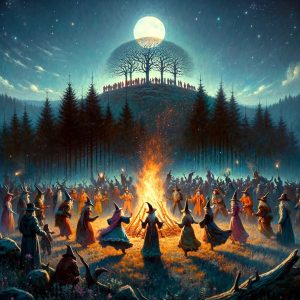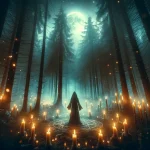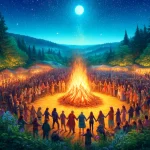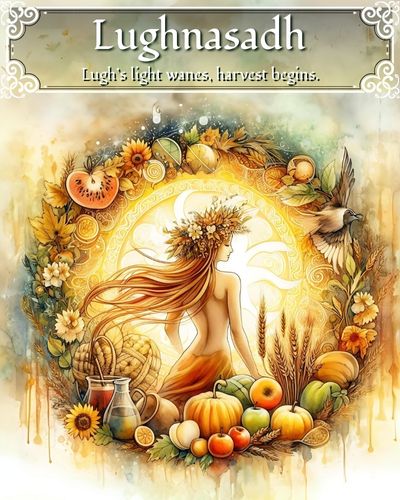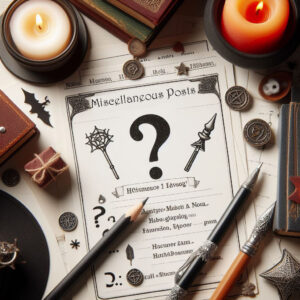
Approx. Reading time: About 10 Minutes

Introduction – Embracing Blessings
Idunn, Bragi, and the Joyful Wassail
As the eleventh day of Yule unfolds, we turn our attention to the divine couple, Idunn and Bragi, weaving a tapestry of rejuvenation and poetic inspiration. In Norse mythology, Idunn, the goddess of spring and rejuvenation, and Bragi, the god of poetry, stand as a harmonious pair, their energies interwoven like the verses of a timeless ballad.

Idunn: Guardian of Eternal Youth and Hope
In the celestial tapestry of Norse mythology, Idunn emerges as a figure of gentle grace and profound significance. Her role as the keeper of the magic apples of immortality places her at the heart of the gods’ perpetual vitality. These mystical apples, when partaken by the divine beings, bestow upon them the gift of eternal youth. In the realm of Yule, where the old gives way to the new, Idunn’s essence becomes a beacon of hope and the promise of rejuvenation.
As the embodiment of spring, Idunn brings forth the vitality and exuberance of the season. Her presence is akin to a gentle breeze, carrying with it the fragrance of blooming flowers and the whispers of new beginnings. In the cycle of nature, spring marks a period of renewal and growth, and Idunn stands as its custodian, nurturing the earth with the vitality that flows from her sacred apples.
The offerings laid at Idunn’s altar symbolize the reverence for her benevolent dominion. Apples, whether plucked from the orchard or fashioned from precious materials, become tokens of appreciation for the goddess’s eternal gift. Potted plants, in their burgeoning life, and flowers, in their delicate bloom, pay homage to the vibrant essence of nature over which Idunn holds sway. Gardening tools, symbols of tending to the earth’s fertility, further emphasize her connection to the verdant tapestry of life.
Idunn’s sanctuary is a place where the eternal meets the ephemeral, where the promise of perpetual youth intertwines with the ever-renewing spirit of spring. In honoring Idunn, we not only celebrate the timeless magic of her apples but also embrace the hopeful energy she imparts—an energy that carries us through the cycles of life with the promise of perpetual beginnings.
Bragi: Maestro of Poetic Harmony
In the symphony of Norse mythology, Bragi emerges as the god whose divine artistry weaves through the realms of poetry and music. His domain, extending into the expressive tapestry of words and melodies, marks him as the muse of skalds—the skilled poets and musicians of Viking Age culture. On this eleventh day of Yule, we turn our gaze toward Bragi, honoring his creative essence that resonates through the very fabric of artistic inspiration.
Revered by those who craft tales with the finesse of a master, Bragi finds joy in the art of poetic expression. His presence enlivens the words that spill from the pens of poets and the enchanting tunes that emanate from musical instruments. On this auspicious day, the altar dedicated to Bragi becomes a stage where musical instruments take center stage, their strings and keys resonating with the divine echoes of inspiration. Well-written books, repositories of profound stories and poignant verses, find a cherished place, embodying the spirit of intellectual creativity that Bragi fosters.
The written and spoken word, infused with passion and artistry, becomes offerings to Bragi on this day. As a storyteller of old, he appreciates the nuance and power of narrative, and so tales spun with fervor and heart take flight as tributes to this god of leisure and entertainment. The altar becomes a testament to the marriage of rhythm and rhyme, where every stroke of the pen and every chord struck on an instrument echoes the divine melody that Bragi, the maestro of poetic harmony, conducts.
In the presence of Bragi, the musings of poets and the resonances of musicians become offerings that transcend the mundane, reaching toward the sublime. On the eleventh day of Yule, as we honor Bragi, we celebrate the transformative power of words and melodies—a power that echoes through the ages, inspiring both mortal and immortal alike.
Recipes
Idunn and Bragi: Nurturers of Yuletide Radiance
In the enchanting tapestry of Yule, Idunn and Bragi emerge as divine figures, each contributing a unique essence that adds to the vibrancy of the season. Idunn, the gentle keeper of the magic apples of immortality, and Bragi, the god of poetry and artistic inspiration, weave a harmonious narrative that resonates with the themes of renewal, hope, and creative expression during the Yuletide festivities.
Idunn: Guardian of Spring’s Promise
Idunn, with her association with the magic apples that grant eternal youth, embodies the promise of spring even in the heart of winter. Her role as the keeper of these rejuvenating fruits aligns with the spirit of regeneration that Yule heralds. As the days begin to lengthen, Idunn’s presence signifies the awakening of life and the anticipation of the verdant season to come. In the offerings of apples, flowers, and symbols of nature, we honor Idunn’s custodianship over the essence of spring, infusing the Yule celebrations with her gentle and nurturing energy.
Bragi: Inspirer of Artistic Splendor
Bragi, the poetic muse and god of artistic expression, connects Yule to the creative forces that stir during the winter months. In the quieter, reflective moments of this season, Bragi’s influence inspires poets, musicians, and storytellers. The eleventh day of Yule, dedicated to Bragi, becomes a celebration of the artistic spirit that finds solace and expression during the long nights. With musical instruments, well-written books, and passionate tales, we acknowledge Bragi’s contribution to the Yuletide festivities, recognizing the intrinsic connection between the creative arts and the winter season.
Together, Idunn and Bragi infuse Yule with a sense of renewal and artistic inspiration. As we honor these divine figures, we partake in the timeless dance of nature’s cycles and the boundless creativity that enriches the human spirit during the winter’s embrace.
Honoring Idunn and Bragi: Songs, Cheer, and Baking
The celebration of Idunn and Bragi is a festive affair, filled with songs, cheer, and the comforting aromas of baking. Musical instruments echo through the halls, as the skald’s artistry and the laughter of merriment resonate in harmony. Idunn is pleased by the offerings of apples or apple-infused creations, embodying the essence of her sacred fruit. Meanwhile, Bragi delights in the melodic tunes and the heartfelt stories shared in his honor.
Honoring Idunn: Embracing the Essence of the Sacred Apple
In the luminous tapestry of Yule, paying homage to Idunn, the gentle guardian of the magic apples of immortality, becomes a poignant act of celebration. The essence of this nurturing goddess is intimately tied to the crisp sweetness of apples, symbolizing not just the fruit itself but the promise of renewal, vitality, and eternal youth.
- Apples: Tokens of Renewal Idunn’s delight is kindled by the humble apple. Whether real or transformed into culinary creations, these fruits symbolize the promise of spring, the cycle of rebirth, and the eternal renewal of life. Presenting apples on the altar is a gesture that transcends the physical fruit; it embodies the cyclical nature of existence and the unending potential for rejuvenation that Idunn brings to the realms of gods and mortals alike.
- Apple-Infused Creations: Culinary Offerings To elevate the act of honoring Idunn, crafting apple-infused creations becomes a delightful expression of devotion. From pies and tarts to spiced cider and apple-scented candles, these culinary offerings mirror the essence of the sacred fruit. Each bite or sip becomes a communion with the divine, a recognition of the interconnectedness between the tangible and the symbolic.
- Floral Tributes: Blooms of Spring’s Anticipation In addition to apples, Idunn’s altar welcomes floral tributes. Potted plants, blossoms, and gardening tools become symbols of the vibrant life that stirs beneath the surface during the winter months. These offerings extend beyond the immediate beauty of the flowers; they signify the anticipation of the coming spring, echoing Idunn’s role as the herald of renewal.
As the fragrance of apples mingles with the freshness of blooms, the act of honoring Idunn during Yule transforms into a celebration of life’s perpetual cycle. In these offerings, we echo the ageless dance of seasons, expressing gratitude for the promise of spring that resides in the heart of winter.
Honoring Bragi: An Ode to Melody and Narrative
In the radiant embrace of Yule, paying homage to Bragi, the god of poetry, unfolds as a harmonious celebration of music, literature, and the art of storytelling. Bragi, revered by skalds and musicians, finds joy in the rhythmic cadence of poetic verses and the enchanting melodies that dance through the air.
- Musical Instruments: Instruments of Praise Bragi’s altar comes alive with the presence of musical instruments. Whether it be the lilting notes of a lyre, the soul-stirring tones of a flute, or the resonant chords of a harp, these instruments become vessels for the expression of devotion. Playing a tune for Bragi becomes a sacred act, an offering of the melodic language that speaks directly to the soul.
- Well-Written Books: Homage to Literature The written word holds a special place on Bragi’s altar. Well-written books, filled with impassioned prose, poetry, and tales, are tokens of admiration for the god of poetry. Each carefully chosen volume is a testament to the enduring power of narratives and the written art form that Bragi so ardently cherishes.
- Words of Poetry and Song: Spun with Passion On the eleventh day of Yule, the air becomes a canvas for the spoken and sung word. Words of poetry, spoken with passion, and songs that echo with emotion become offerings to Bragi. In the flickering glow of Yule lights, the stories told and the verses recited become a symphony of appreciation for the god of leisure and entertainment.
As we honor Bragi, we weave a tapestry of melody and narrative, inviting the spirit of poetic inspiration into our homes. In the rustling pages of well-loved books and the resonant chords of musical instruments, we find a communion with the divine, expressing gratitude for the enduring magic of words and music that transcend the boundaries of time.
Wassailing: A Joyful Tradition of Blessings
As the eleventh day of Yule unfolds, a time-honored tradition takes center stage—Wassailing, an enchanting practice deeply rooted in the tapestry of Anglo-Saxon culture. Wassail, a hot and spiced mulled drink, becomes the elixir of goodwill, symbolizing the collective hope for a bountiful apple harvest and an auspicious year ahead.
Wassailing involves a delightful ritual of encircling a fruit tree, forming a harmonious circle that mirrors the interconnectedness of nature and the community. As participants join hands, their collective energy resonates with the life force of the tree, fostering a sense of unity with the orchard and the land. This communal act becomes a dance of celebration, a joyful acknowledgment of the cyclical nature of life.
With the circle formed, voices rise in song, echoing through the winter air with melodies that speak of joy, hope, and gratitude. The songs, crafted with love and shared in unity, become offerings to the spirits of the orchard, awakening the dormant energies of the trees and inviting blessings for a fruitful harvest. In this shared chorus, the essence of Wassailing transcends the mere act of singing—it becomes a heartfelt conversation with nature.
In a gesture of communal generosity, pieces of toast soaked in Wassail are placed in the branches of the fruit tree. This offering is not just for the enjoyment of our avian friends but serves as a symbolic act of gratitude to the spirits that watch over the orchard. The toast, drenched in the warmth of Wassail, becomes a token of appreciation for the interconnected web of life, where humans, nature, and the divine coexist.
As the sweet aroma of Wassail fills the air and the songs of celebration linger in the winter breeze, Wassailing becomes a bridge between the human realm and the spirit of the orchard. It is a tradition that transcends time, weaving together the threads of the past, present, and future—a joyful celebration of nature’s abundance and a fervent prayer for prosperity in the cycles yet to unfold.
Inviting Prosperity: Symbols of Luck in the New Year
In the intricate dance between tradition and belief, the eleventh day of Yule heralds the arrival of symbols believed to usher in prosperity, positivity, and good fortune as the new year beckons. Across cultures and traditions, various tokens and charms are embraced, each carrying its unique resonance of luck and positive energy.
- Elephants: Guardians of Prosperity Tiny elephant ornaments, with their trunks raised in a gesture of triumph, find their place as guardians of prosperity. Symbolizing strength, wisdom, and loyalty, these small pachyderms become silent sentinels, positioned strategically to invite good luck and ward off negative energies. Their presence within the home creates a harmonious atmosphere, promising a year filled with understanding, protection, and enduring fortune.
- Fish in Aquariums: A Watery Symphony of Prosperity Within the fluid realms of aquariums, fish become more than aquatic companions—they transform into symbols of good health, prosperity, happiness, wealth, and power. As the eleventh day of Yule unfolds, tending to these underwater realms takes on a special significance. Cleaning the aquarium, changing out plants, and infusing the water with fresh energy become rituals that ensure the flow of positive vibes into the upcoming year.
- Crystals: Jewels of Positive Vibrations The eleventh day of Yule also welcomes the radiant energy of crystals into homes. Each crystal, with its unique properties, becomes a jewel of positive vibrations. Rose quartz, known for its association with love and happiness, weaves a tender embrace of affection. Turquoise, with its calming influence, promises tranquility and balance. These crystals, strategically placed, form a sparkling network of positivity, creating an ambiance of serenity and well-being.
- Nature’s Charms: Leaves, Clovers, and Aloe Vera Embracing the wisdom of nature, homes welcome symbols that echo peace, balance, and good fortune. Plants with rounded leaves, strategically positioned near entrances, become silent guardians of harmony. Four-leaf clovers, renowned for their rarity, are cherished as tokens of luck. Aloe Vera, with its enduring vitality, finds its place as a harbinger of positive energy, symbolizing longevity and the promise of a thriving new year.
In this symphony of symbols, the eleventh day of Yule transforms into a canvas adorned with representations of luck and positive vibrations. As each element finds its place within the home, it contributes to the creation of an environment steeped in the promise of prosperity, balance, and the enduring magic of the coming year.
Harmony, Joy, and the Magic of Renewal: A Closing Ode to the Eleventh Day of Yule
In the waning moments of the eleventh day of Yule, as Wassailing songs fade into the crisp night air and the laughter of festive cheer lingers, we stand at the threshold of renewal. Today’s activities, from honoring Idunn and Bragi to the joyous tradition of Wassailing, become more than mere rituals—they are symbolic acts of decluttering, a shedding of the old to make way for the new.
In this symphony of celebration, we have woven the blessings of Idunn and Bragi into the fabric of our homes. The promise of rejuvenation, the gentle embrace of spring’s essence, and the poetic inspiration embodied by Bragi linger in the air, infusing our spaces with timeless magic.
As we bid farewell to the eleventh day of Yule, may our homes resonate with the harmony of nature’s bounty, the joyous melodies of music, and the enduring magic of this sacred season. In the quiet moments that follow, let us carry forward the promises of luck, positivity, and renewal, ready to welcome the coming year with open hearts and the echoes of Yule’s timeless enchantment.






